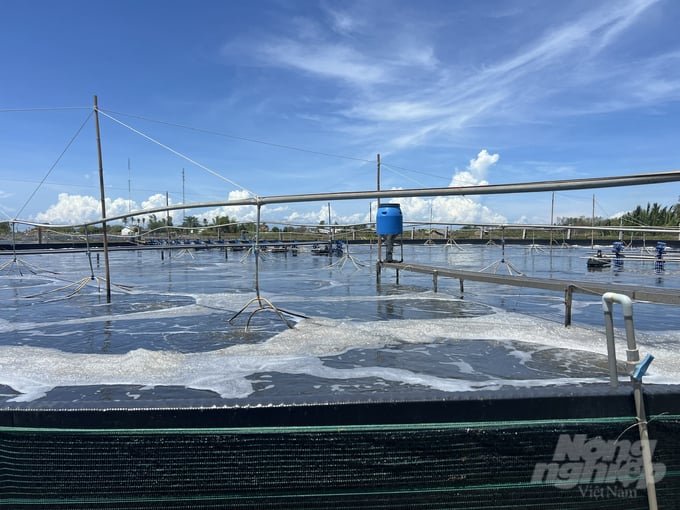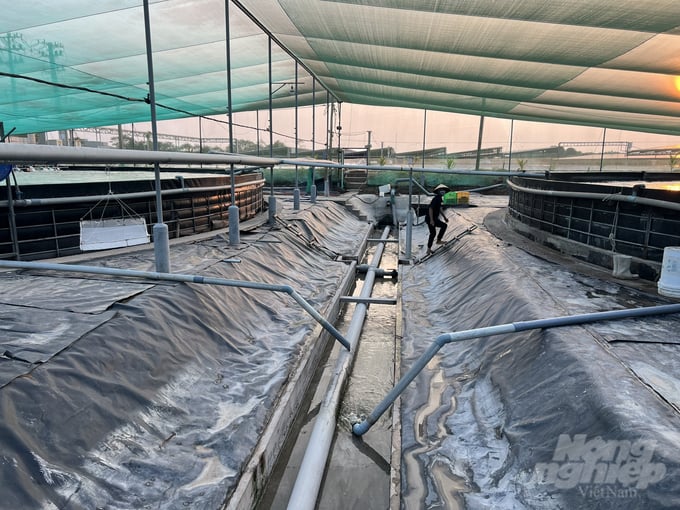November 25, 2025 | 20:27 GMT +7
November 25, 2025 | 20:27 GMT +7
Hotline: 0913.378.918
November 25, 2025 | 20:27 GMT +7
Hotline: 0913.378.918

The shrimp pond of Vinh’s family in Ngoc Hien district. Photo: Trong Linh.
Ca Mau has many shrimp farming models that bring high economic value, such as extensive farming, improved extensive farming, intensive farming and super intensive farming. Despite the advantages that shrimp products bring, Ca Mau shrimp farmers have to face many challenges with the most visible being climate change. Diseases on farmed shrimp are also considered a major threat.
With more than 30 years of experience in shrimp farming, including 10 years of high-tech shrimp farming, Nguyen Van Vinh, a farmer in Ngoc Hien district, said, “For more than a year now, I have not made a profit from shrimp farming, at best I break even”.
On the one hand, shrimp prices are lower than in the years before the COVID-19 pandemic, on the other hand, goods for shrimp farming such as medicine, food, and equipment have all increased in price, putting shrimp farmers in a difficult situation. If they fail a crop, they will immediately fall into debt. The shrimp farming process is constantly threatened by diseases, so they have many things to worry about.
Mentioning diseases in shrimp, Vinh said, “There are all kinds of diseases, but the most common diseases that industrial shrimp farmers encounter are white feces syndrome (WFS) and the parasite Enterocytozoon hepatopenaei (EHP). These two stem from the influence of bad weather and water sources containing diseases”.
When infected with these two diseases, 90% of the shrimp farms suffer heavy losses, the remaining 10% are break-even. Industrial shrimp farmers almost make no profit when their shrimp are infected. "It cannot be saved, if they are lucky to even break even, otherwise they will lose hundreds of millions of VND per pond. There is no clear standard to measure the effectiveness of prevention work," he said.
In the case of Tran Van Khai, an industrial shrimp farmer in Ngoc Hien district, since the beginning of the year, he has been devastated by the disease. Every time he releases shrimp, the pond gets EHP and WFS. He is in a difficult spot because of losses.
"The current weather is showing erratic developments. This area near the sea has a lot of rain so farmed shrimp are very susceptible to disease due to reduced resistance. The bacteria that cause disease now evolve quickly. Even when manufacturers create new drugs, after a short time they become resistant to the drugs. We try to take the best care method possible, but there is no absolute way to prevent it. It's not that you can achieve 100% output if you have good techniques and good equipment. There are many other factors such as environment, water source, and weather," Khai said.

Shrimp farmers use biological products to mitigate environmental impact. Photo: Trong Linh.
According to Dinh Hai Dang, an aquaculture technician in Ca Mau, extensive shrimp farming rarely has any diseases because farmers usually only release the seeds and do not take care of them. Shrimp are raised at low density, so dangerous diseases rarely occur, mainly due to vitamin and mineral deficiencies. As for high-tech industrial farming, the most common diseases are WFS, acute hepatopancreatic necrosis disease (AHPND), intestinal bacteria, fungus, black spot disease, and most recently, translucent post-larvae disease (TPD).
“Seed is an issue of great importance. In order for the farming season to gain favorable results, farmers should choose reputable seed suppliers. The seed stock must be healthy and have good resistance. The breeding environment must be well treated. Farmers should also monitor the development of the shrimp regularly to promptly detect diseases and treat them right from the start,” said Dang.

It is crucial to make sure that the pond treatment system is safe and does not negatively affect the environment. Photo: Trong Linh.
According to Ca Mau Department of Agriculture and Rural Development, heavy rain can reduce the salinity of water in the pond, causing shrimp to be shocked and susceptible to disease. Shrimp farmers must therefore check the salinity, pH, and other important parameters frequently to make timely adjustments in the farm area.
Rainwater can even reduce the temperature and change the water environment, affecting the shrimp’s appetite and growth rate. It is necessary to adjust the amount of food appropriately, and avoid overfeeding which may cause surplus and pond pollution. Farmers can consider adding more vitamin C and minerals to increase the resistance of shrimp.
Translated by Samuel Pham

(VAN) Deputy Minister Nguyen Quoc Tri emphasized the determination to prevent violations at CoP20, sharing enforcement results and commitments to strengthen cooperation with the international community in the coming period.

(VAN) In addition to strengthening the relationship between schools and enterprises, the Aus4Skills project expands opportunities for female students and people with disabilities to work in the transport and logistics sector.

(VAN) Nghe An is preparing policy, technical, and resource steps to participate in the forest carbon credit market.
/2025/11/25/1648-2-110733_532.jpg)
(VAN) From 2011 to 2023, Ca Mau province lost approximately 6,200 ha of coastal land and protection forests due to erosion, threatening many residential areas, infrastructure facilities, and production zones.

(VAN) Quang Ngai holds strong potential for carbon credits but needs a clear legal and policy framework to secure sustainable revenue from this resource.

(VAN) With its diverse ecosystem, Phu Quoc National Park plays a vital role in environmental protection and biodiversity conservation and serves as the core zone of the Kien Giang World Biosphere Reserve.

(VAN) Cooperation activities under the Aus4Skills program focus on: logistics professional development, competency-based training and assessment (CBTA), leadership innovation, and digitalization.